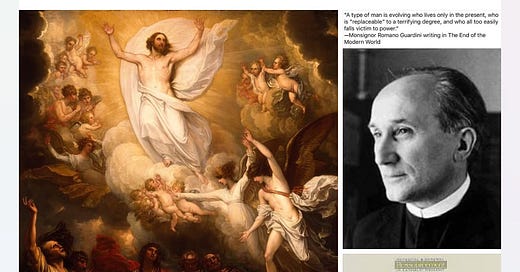Technological Man: Loss of Faith, Loss of Humanity
The theologian, Monsignor Romano Guardini (1885-1968), was deeply prescient about the high stakes of 20th century-and now 21st century- “technological man” losing his faith in God, as revealed in the God-man, Jesus Christ. As Guardini summed up both the danger and the situation:
“Only those who know God, know man. Without knowledge of God, man is easily manipulated.”
We are all now “technological man” whether we realize it or not. Further, we have breathed in the materialistic, technological paradigm as the norm of life. From the simple, I’ll text a friend instead of call or visit; to the more serious worship of medicine as a hope of salvation; to the technological manipulation and/or nullification of our fertility; to the even more brutal transgender ideology, which terminates in the radical mutilation of one’s person due to a disordered relationship to reality; thinking we’re just material stuff to be manipulated by technological intervention.
Soon will experience a host challenges posed to our humanity by artificial intelligence and its growing applications.
Precisely because “modern man” has lost, misremembered, or rejected the graced ordering of Christ the Logos (eternal meaning, truth, goal, final end) we have lost the vision of the truth and reality of man. Having largely lost the vision, modern man clambers to fill the void with disordered emotion coupled to technological power.
Consequently, we are now witnessing the drama of anti-theistic, anti-humanism playing out in the world. We are players in this drama, whether we realize it or not. The only way to resist this anti-theistic anti-humanism, and to offer an authentically human, graced rebuttal to it is deepen our relationship with Jesus Christ, in Word, Sacrament, and Church.
Through the inseparable means of Word, Sacrament, and Church, God reveals Himself continuously to man by imprinting His image upon him. That divine operation constitutes the very center of man of man. That is what makes him spirit (cf. Henri de Lubac).
It is through prayerful reading of the Sacred Scriptures, the faith-filled reception of the Holy Eucharist, along with a regular, devout, and prepared Confession, gathered by the Holy Spirit in the community of believers, which makes us authentically human.
It concerns me so few Catholics go to Confession. Our communion with Christ in the Eucharist cannot deepen unless His Divine Mercy regularly washes us clean of sin. And if we are not regularly seeking His Divine Mercy, we are putting an obstacle to Christ’s desire to imprint His image-the fullness of humanity-upon us. To become truly human, we must become truly united to the Divine, through the inseparable graces of repentance, conversion, Confession, and Holy Communion.
If we separate the graces of repentance, conversion, and Holy Communion from regular Confession, and thus the Church-we will end up with makeshift Christianity, not the Living Christ. We’ll be drawn into idolatry—worshiping a Christ of our making, suited to our sensibilities, fashioning ourselves in our own deficient likeness. Such will make us prey to the unholy spirit of the anti-theistic anti-humanism playing out all around us.
The driving force of the drama of anti-theistic anti-humanism is to remake us in the image of the material-technological: everyone reduced to a unit of consumption and production, a number, a dollar sign, and objects of manipulation by both ourselves and the powerful who wish to manipulate us.
We must resist this. How? As Msgr. Guardini observed:
“Something must exist in which the truth of the heart can constantly renew itself, in which the spirit can be cleansed, the eye cleared, the character strengthened. And there is: adoration. Nothing is more important for man than to incline his spirit before God, personally to experience the truth that is God—this is great and sacred and salutary for body and soul.”



